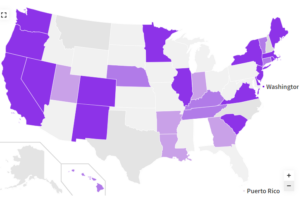Are Breastfeeding Workers Protected by Law?
Your employer is required by the PUMP Act/Break Time for Nursing Mothers Law to provide you with as-needed break time to express milk and a space that is not a bathroom where you can express milk in private. This must be provided until your baby is one year old.
Under the national Pregnant Workers Fairness Act, if you work for an employer with 15 or more employees, you have a right to workplace changes for lactation and other pregnancy-related conditions. These changes, called “reasonable accommodations,” can include things like lactation breaks and space beyond one year after birth, avoiding toxic chemicals, and scheduling changes.
Nationwide law bans discrimination against lactating workers, and you may also have other rights at work under state and local law. Read on to learn more.
Thinking about how to talk to your boss about pumping breaks, private space, or other breastfeeding accommodations? Learn about your legal rights and view practical tips created by WorkLife Law and A Better Balance. Click on your state below or view our national guide.
Need more information or guides in other languages? Contact us!
Utiliza nuestras guías para aprender tus derechos y obtener consejos prácticos para hablar con tu empleador sobre las adaptaciones que necesitas para amamantar. Creado por Center for WorkLife Law y A Better Balance.
Contact the Center for WorkLife Law’s free legal hotline to speak to a lawyer about your rights.
Email [email protected] or call (415) 703-8276.

Check out Supporting Nursing Moms At Work: Employer Solutions, an industry-specific guide from the U.S. Department of Health and Human Services about how to find or create private space in your own working environment.







